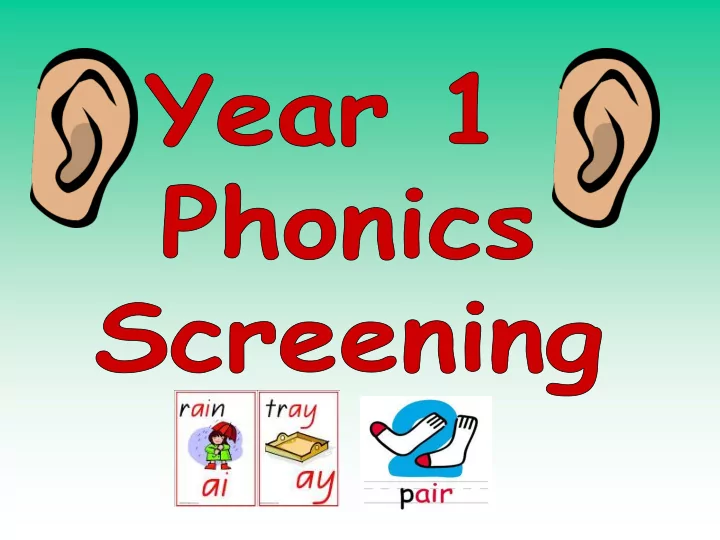

• To understand what the Y1 Phonics Screening Check challenge is all about • To have an overview of next steps how we teach phonics • How you as parents/ families can help • To answer any of your questions
• Children are taught to read by breaking down words into separate sounds or ‘phonemes’. They are then taught how to blend these sounds together to read the whole word. • Children have a 30mins phonics lesson each day and they are encouraged to use these strategies to read and write in other lessons. • There are around 40 different sounds.
• It is a statutory assessment for all pupils in year 1 to check whether they have met the expected standard in phonic decoding. • Every Year 1 child in the country will be taking the phonics screening check in the same week in June. • Pupils who did not meet the standard in year 1 must also take part in the check at the end of year 2.
• The aim of the check is to ensure that all children are able to read by the end of year two. •This ‘midpoint check’ will ensure that we have a clear understanding of what the children need to learn in year 2.
• The check is very similar to tasks the children already complete during phonics lessons. •Children will be asked to ‘sound out’ a word and blend the sounds together.eg d-o-g - dog • The focus of the check is to see which sounds the children know and therefore the children will be asked to read made up ‘nonsense’ words. THIS IS NOT A READING TEST
• The government initiative was initially piloted in 300 schools over a two year period. It was first introduced in 2012. • Only 33% of children in the pilot study scored enough to indicate they need no further support in year 2. This figure has increased over the years since the implementation of the check.
• The percentage of children passing the screening check has increased year on year since its introduction in 2012. • More than 4 in 5 pupils (82%) met the expected standard in the phonics screening check at the end of year 1 in 2019, an increase of 24% since the introduction of the check in 2012. • Over the last 4 years the proportion meeting the standard in year 1 and by the end of year 2 has been broadly stable.
• The screening will take place during the week commencing Monday 8 th June. The children cannot retake the test at any other time so it is very important your child is in school during this week. • The check has been designed so that children of all abilities will be able to take part.
• The children will complete the check one at a time in a quiet area of the school. • I will conduct all of the screening checks with the children. • The screening will only take 5-10mins with each child • Rest breaks will be provided if necessary.
• Scored against a national standard – 32/ 40 pass rate previous four years – pass rate not available until all marks are sent in Nationally to get a benchmark • If children are in line and standard met - children will follow on from RWI with our spelling scheme ‘No Nonsense Spellings’ in year 2 • If not yet in line and standard not quite met – additional booster/ intervention in RWI then the Screening Check will be repeated again at the end of Year Two. Children will still follow on with our spelling scheme.
• Daily phonics 30 minutes • Quality whole class teaching • Up to date training for all staff • Send home spellings weekly to learn to read and spell consolidating sounds taught in school • On going RWI assessments every half term / sounds and tricky words • Practise screening checks half termly • Interventions to boost gaps from now and throughout the year
•Encourage your child to ‘sound out’ when reading or writing. Focusing particularly on spotting more unusual sound patterns. For example, Digraph- 2 letters making one sound cow also known as ow in the word blow Trigraphs- 3 letters making one sound night / fair / pure / fire Split digraphs- 2 vowels with a consonant inbetween. This used to be known as the magic e spine - i_e
• Encourage your child to use their sound mat when reading and writing and use the phrases to find the sound they need. • Children can practise their phonics by playing games online. The children particularly like ‘Buried Treasure’ • http://www.phonicspla y.co.uk/BuriedTreasure 2.html
• REMEMBER: Phonics is not the only thing needed to become a fluent reader. • Please continue to read with your child each night and encourage them to: • Sound out • Re-read to check it makes sense. • Use pictures for clues. • Ask questions about the book. • And most importantly ENJOY READING!
Recommend
More recommend